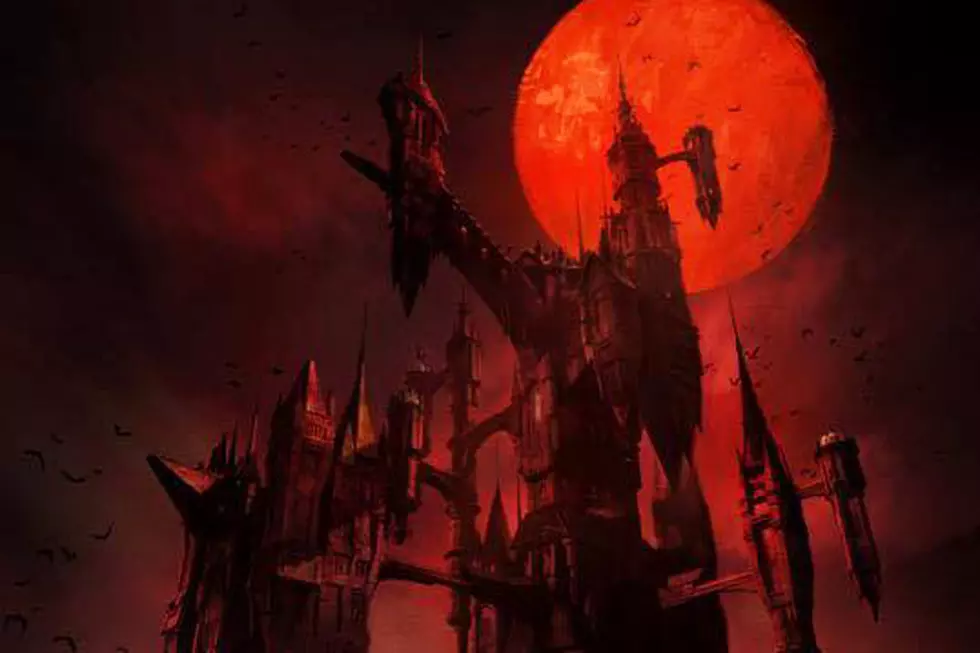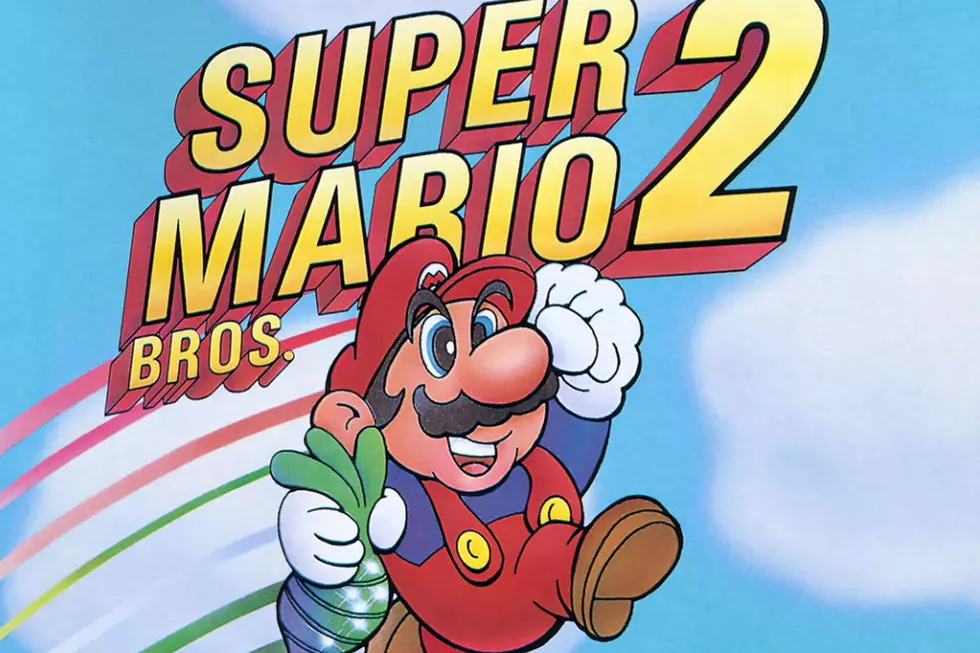
The Unbelievably Bizarre ‘Worlds of Power’ Novel Based on ‘Castlevania II’

Here's what happens on the very first page of the 1990 "Worlds of Power" novelization of Castlevania II: Simon's Quest for the NES:
"No, Count Dracula! You will not drink my spirit this day!" he said, snapping his thorn whip with a crack as loud as a gunshot. "And by the way, it doesn't taste like cherry pop at all, so it's nothing you'd want anyway!"
And it just gets crazier from there. Folks, I am a guy with some strong feelings about Castlevania II: Simon's Quest. I first played it back when it came out in the late '80s on a weekend that was thoroughly ruined the moment I stepped out a video store with the goal of spending the next two days trying to conquer this absolute mess, and it remains the one video game I hate more than any other.
Folks, I am a guy with some strong feelings about Castlevania II: Simon's Quest. I first played it back when it came out in the late '80s on a weekend that was thoroughly ruined the moment I stepped out a video store with the goal of spending the next two days trying to conquer this absolute mess, and it remains the one video game I hate more than any other.
To its credit, Castlevania II was an extremely ambitious game. It sought to combine the platforming action that had made Castlevania an instant NES classic with the added depth of RPG-style gameplay. It's essentially the same formula that the developers at Konami would revisit ten years later to make Symphony of the Night, hands down one of the best games of the PlayStation era, and pretty much every game that came out of that franchise for the next decade.
The problem was that with Castlevania II they botched it in every single way they could. Lackluster graphics, endless, pointless grinding, awful level design that could kill you with a misplaced jump even in the town where you started... Even the pretty interesting mechanic of switching from day to night with tougher enemies in the dark was done so poorly that it was featured on every single one of the roughly 40,000 "Worst Moments in NES Gaming" lists written on the internet since 1998.
In short, it was so bad that two decades later, I am still obsessed with it. So imagine my absolute joy when I found out that someone had turned it into a novel.
It was part of a short-lived line of books called Worlds of Power, which hit shelves courtesy of Scholastic in 1990. Credited to writer F.X. Nine -- a name that's not even trying not to sound like a pseudonym -- Worlds of Power was a series of books for young readers that were based on video games. In all honesty, it's a pretty brilliant concept, in that editor Seth Godin realized that his nephew preferred playing video games to reading and tried to lead him to print with... well, with what basically amounts to ten novels' worth of fan-fiction.
The Castlevania II novel by Christopher Howell, though, brought something different to the table:

Rather than just following the game's plot of Simon Belmont collecting Dracula's various body parts so that he could bring him back to life and then kill him for really really real this time, this novel brings in Tim Bradley. Tim's a kid who loves video games, and who just so happens to be really good at playing Castlevania. The bit above with the reference to Dracula drinking cherry pop (hilarious) is actually what's going on in Tim's head as he plays through the last boss fight in the first game, which basically makes it a fanfic within a fanfic.
And since I've already referred to this as fanfic, you can probably guess what role Tim ends up playing in the story:

That's right, everybody: Tim is so good at video games that Simon Belmont himself comes to life and comes to him for help fighting Dracula and they go on an adventure and become best friends and talk about how cool the Macho Man is and then we fight Dracula and Simon Belmont becomes my new dad and --
Uh, sorry. Got caught up in the story there for a second.
Which is exactly the point. Seriously, Tim Bradley is the biggest wish-fulfillment character in fiction since Bob Kane created a handsome badass millionaire crime-fighter whose name rhymed with his own. Of course, this leads to a pretty huge problem with this story, in that a lifetime of playing Nintendo games does not actually prepare you for beating monsters to death with a whip in a haunted forest, no matter how much we may wish that was the case.
I mean, I'm pretty sure that during the '90s, I logged more hours into Tony Hawk's Pro Skater than I did in my actual high school, but if you give me a skateboard and shove me off the roof of a skyscraper, it doesn't matter how much the bottom of that building looks like a halfpipe. I am going to die. And that's without even getting the undead involved.
Fortunately for Tim, he has one weapon in his arsenal that even Simon Belmont does not possess:

See, in the world (Of Power) presented by this novel, Dracula's weaknesses include garlic, a wooden stake driven through his heart, and god-awful puns, which I assure you Tim Bradley has a lot of to dish out.
And it's a good thing he does. The plot of Castlevania II revolves, as the title suggests, around Simon Belmont being cursed to have his mortal body taken over by Dracula. So in addition to his junior whipsmanship, Tim gets tasked with punning Dracula straight back to Hell whenever Simon's pure soul is in danger of succumbing to one of the Seven Deadly Sins.
I gotta say, the inclusion of the Seven Deadly Sins as a plot device was one of the strangest choices this book made, and considering that we just got through the part where a kid goes to the Nintendo dimension to fight Dracula with bad jokes, that's saying something. It's played up a couple of times, like when Simon almost indulges his sloth by sleeping in instead of waking up early to whip skeletons, but Howell seems to hit a wall with that about halfway through. We definitely don't ever get around to seeing Lust, which is a little weird since the whole thing is based on Simon trying to rescue his fiancee before he turns into Dracula. Then again, I'm not sure there's any combination of a man dressed entirely in leather, his whip, and a bunch of surprisingly animate corpses that could be presented as "Lust" in a way that Scholastic would feel okay selling to fifth graders.
Even with that omission, it's not as easy as it sounds, mostly because Tim is dealing with an addiction:

This is, without question, the crown jewel of this book's eccentricities. Tim is depicted as being literally dependent on chocolate, unable to go two hours without lying to his friends and sneaking off for a fix, even when he's in danger of being literally murdered by Dracula. It's actually his entire arc as a character, that after spending two days in a haunted video game dimension, he's able to face the world without having to chase that brown dragon.
Don't get me wrong, childhood obesity is definitely a problem -- especially for kids who would sit around playing through Castlevania 19 times -- but this book goes almost to the level of suggesting that without having to go cold turkey in the land of Castlevania, Tim would've ended up on the street, snorting the remnants of Swiss Miss packets that he fished out of dumpsters and offering to "do stuff" in exchange for a handful of M&MS.
It's pretty grim.

But in the end, Tim's able to kick his 3-bar-a-day habit and he and Simon defeat Dracula once and for all, everything works out okay, and kids everywhere learn a valuable lesson about how you should always go with any leather-clad man who shows up in your school bathroom and tells you he wants to take you to another dimension.
They probably could've thought that one through a little better.
But there is one last bit of amazing before the book ends. Just before Simon Belmont abducts Tim from the bathroom -- and I am not even kidding about that -- Tim has run afoul of his local bully. As soon as he steps out of the bathroom, he's in for a fight, and with dimensional travel being what it is, he'll be popped back into his own life right at the same moment he left, with that fight hanging over his head.
But now, thanks to two days fighting monsters, he has the confidence he needs to face his problems:

THIS IS THE GREATEST THING ANYONE HAS EVER WRITTEN.
Why, in the name of all that is good and holy, have we as a society not started referring to our problems as "Draculas?" This needs to happen, if only because Castlevania II was definitely my Dracula when I was a kid. It is a seriously amazing turn of phrase.
Especially because it implies that Tim deals with his bully by shoving a wooden stake through his chest and setting him in fire.
More From ComicsAlliance





![Strange Company: The Marvel Mystical Fantasy Draft, Part One [Fantasy Week]](http://townsquare.media/site/622/files/2016/10/mystic-day-one-feat.jpg?w=980&q=75)



